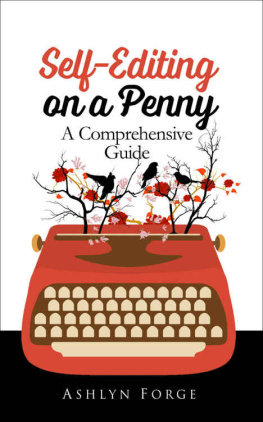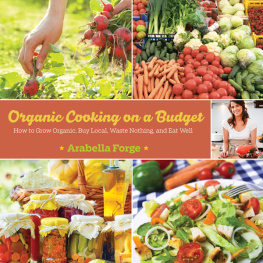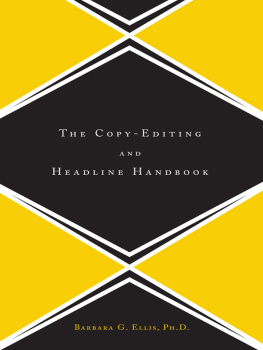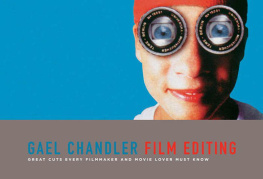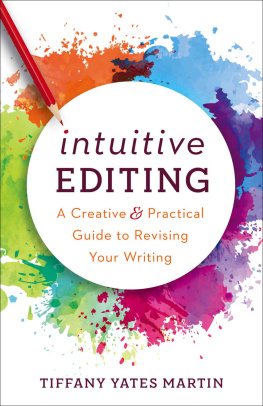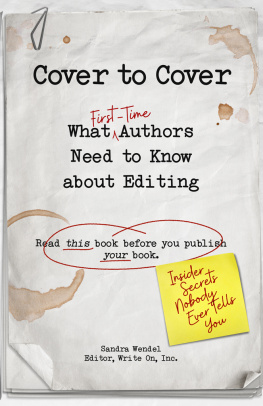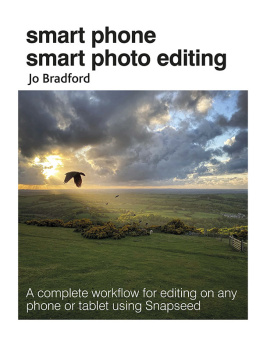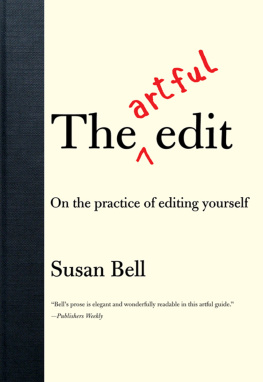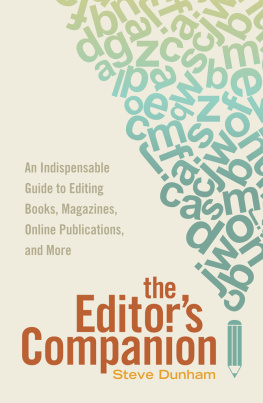Self-Editing
On
a Penny
A Comprehensive Guide
Ashlyn Forge
This book is a work of nonfiction; however, it entails fictional examples. Names, characters, places, and incidents either are products of the authors imagination or are used fictitiously. Any resemblance to actual persons, living or dead, events, or locales is entirely coincidental.
Copyright 2014 Ashlyn Forge
Published in Japan
Cover Images
Cover Design by KM Writing & Design
http://www.ashlynforge.com
All rights reserved. No part of this book may be reproduced or transmitted in any form or by any means, electronic or mechanical, including photocopying, recording, or by any information storage and retrieval system without the written permission of the author, except where permitted by law.
The text of this book was set in Garamond.
First Edition March 2015
ISBN-13: 978-1508460664
Contents
Preface
If youre thinking, Im barely literate. Im not an avid reader. Grammar makes me sweat, so much so that I have been asked if Im really a native English speaker. I dont know a comma splice from a hole in the wall. Can I still become a writer?
Then the answer is yesand no.
To put it bluntly, a good story presented with poor editing and typos is like a good meal served on toilet paper. Itll still taste good, but itll be harder to sell; and those who do eat it do so with trepidation and a possible cringe.
Your story is art. It deserves more. You wouldnt serve your specialty on paper plates so dont give your reader a less-than-perfect book riddled with errors.
Good storytelling is paramount and although proper grammar does not a good author makeit sure helps.
The following chapters provide you not only with some cost-effective shortcuts, but also methods to help you clean up some messy areas and lighten your burdensome self-publishing load.
Before we begin, know that there is no self in self-publishing. Equally, there is no self in self-editing. Dont try to do it all aloneeven superheroes have help.
Sooner or later you will need to show others your work and get feedback. You will also need the one thing no amount of money can buy: sober expectations .
Self-Editing on a Penny will teach you how to self-edit, self-edit well, and do it all either in budget or free.
This book hopes to touch base on important (yet easily overlooked) grammar points, misused words, and creative-writing techniques.
It is written from the perspective of an indie author who has used both professional editors and cost-effective even free methods to edit.
Ive taken one for the team, so you dont have to. Youre welcome.
Why Self-Edit?
Self -editing? Isnt that what an editor is for?
There are many reasons to self-edit.
Here is the first warning. No, you cannot self-edit and then publish right away. When its our own work, we dont have the ability to be critical and objective enough to edit perfectly.
That being said, we can self-edit and reduce professional editing costs. We can also self-edit and couple it with other methods in order to make the edit free .
Bottom line, your WIP (Work In Progress) is not officially a final draft until you self-edit. You will no doubt go through the manuscript multiple times. Pace yourself so that you dont burn out and grow tired of it.
Here is another very important factor with regards to editing: there are three major edits: a content edit, a line edit, a proofread. Skimp on one at your own peril.
Often times, the first edit (content edit) is overlookedauthors simply skip it. Line editors will not tell an author the story is bad. That is not their job. Their job is to make the sentences coherent . Equally, a proofreader will be even less likely to blow the whistle and say, Hey, this garbage needs a lot more work.
Basically, you might be strutting around unaware your zipper is open, proud as ever of your manuscriptnot realizing others are speechless for the wrong reasons.
Someone incredibly compassionate and friendly might pull you aside and tell you the truth. Most wont. Art is subjective and many people dont want to go out of their way to make you uncomfortable. They will do the specific job you requested and call it a day.
So please self-edit; please go slowly; and please dont cut corners if you can afford it.
Reasons to Self-Edit
- Lower the cost of editing: When you self-edit, you reduce an editors burden and therefore the editor might charge you much less. If a piece is especially awful, an editor might even refuse. By polishing that manuscript beforehand, you not only put an editor at ease, but you might essentially be getting a cheaper edit. Also, because there are many types of edits, a good self-edit might mean you dont have to invest money in each and every one, thus reducing your cost. Supplemented with a professional editor or otherwise, a proper self-edit can save you a lot of time and money, and help you hone your craft.
- Improve your writing: Self-editing is a great way to hone your skills. You learn something new each time you edit. The path is not easy, but with each new technique you learn, you become a stronger writer.
- Protect yourself: There are more than enough fake (and bad) editors out there. The more you know about grammar and the editing process, the easier it is for you to spot phonies and save yourself a world of suffering. Take it from me, because even now, two years later, Im still eating my hat.
- Write faster: Sometimes those of us who care about smooth writing and good prose know we arent writing as well as wed like. That leads to self-doubt. It also leads to getting stuck in areas where we should never have been in the first placewriting yourself into a corner, for example. A good grasp of grammar and the rules of creative-writing will make you far more confident while providing you with the knowledge to make that first draft shine. Oh, itll still stink (all drafts are bad), but itll certainly shine.
Getting Started
Chances are the bulk of your publishing cost will go into editing. Here are some guidelines that will serve you on your self-editing journey.
Rule #1: There is no such thing as a cheap editor. Someone starting out who might not be as confident might edit for free or out of the goodness of his/her heart, but that doesnt mean youll get something for nothing: you will be a guinea pig. Youve just donated your body (of work) to science.
Cheap editing = poor editing. As editing is rather time-consuming and editors have bills to pay, if you get a cheaper edit, its likely the editor is simply not very good. OR, if the editor is good, he/she might have a heavy workload. That means your manuscript is just one of many to zip through before the month is out. Editors deserve a decent wage, so if you hire an editor, expect to pay from the latter end of hundreds to actual thousands.
Rule #2: Never use just one source (editing source). Other than the technical, edits are opinions and youll need a few before its all said and done.
Rule #3: Leave your family out of this. A family is a family, not a company, and certainly not a publishing company. Self-publishing is a sometimes stressful journey. Go home to your family to rest, not to publish more. Family members tend to build you up, sometimes when they shouldnt. Its not always objective.
Rule #4: Do not defend your work. If an editor tells you something, take it or leave it, ask a question if you have to, but dont defend your work to him/her. Being defensive means you arent objective and therefore high maintenance. It doesnt matter what you tried to convey. You obviously didnt do it well. Getting other opinions also means you can see what parts of the editors critique were subjective.

